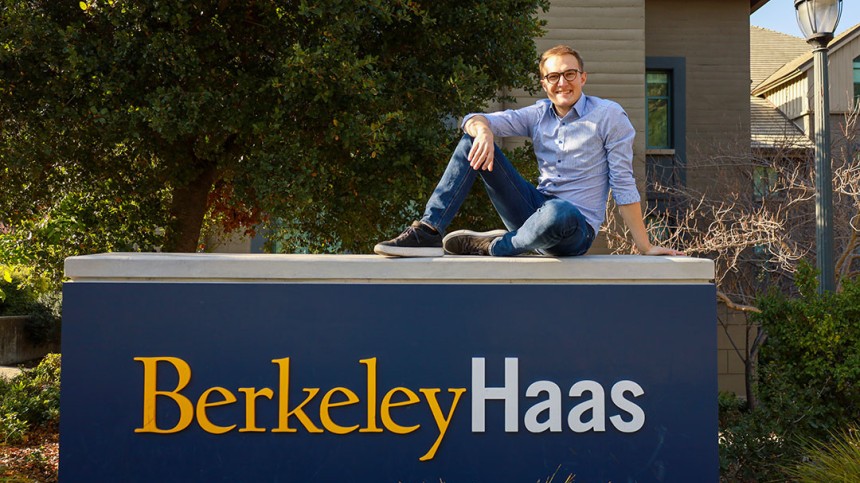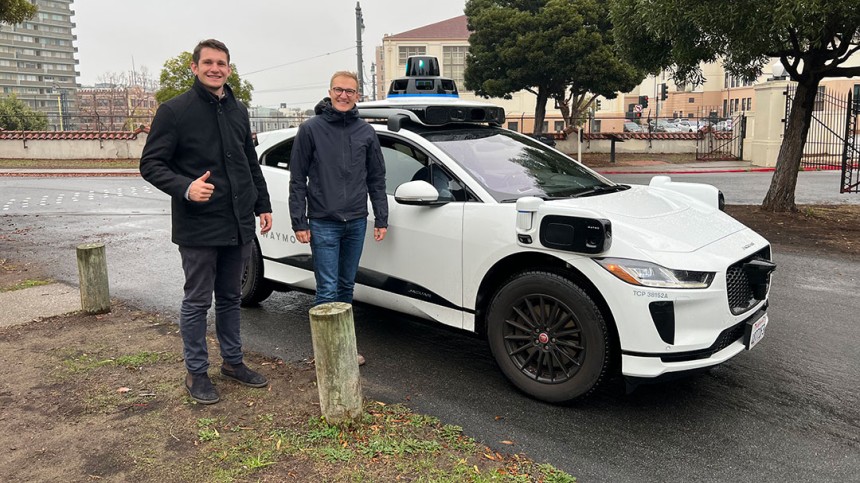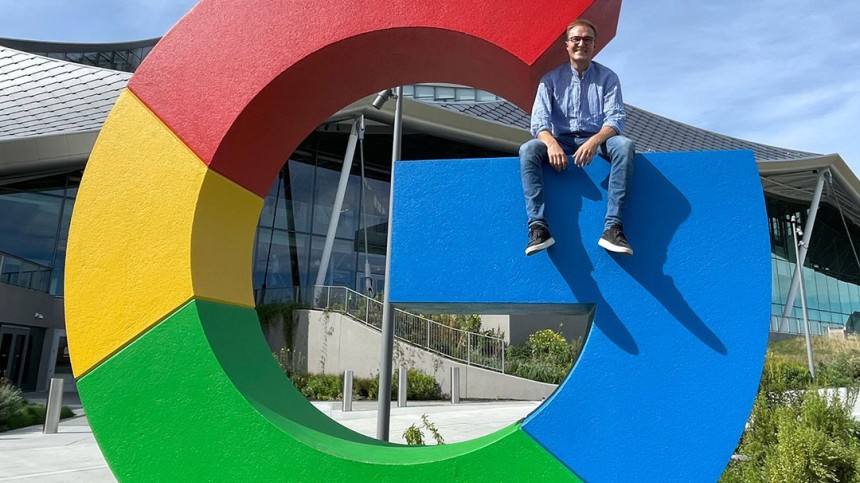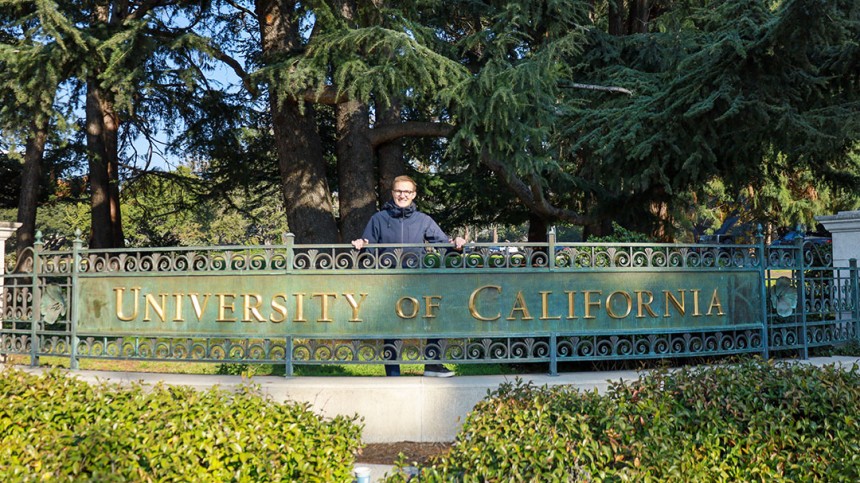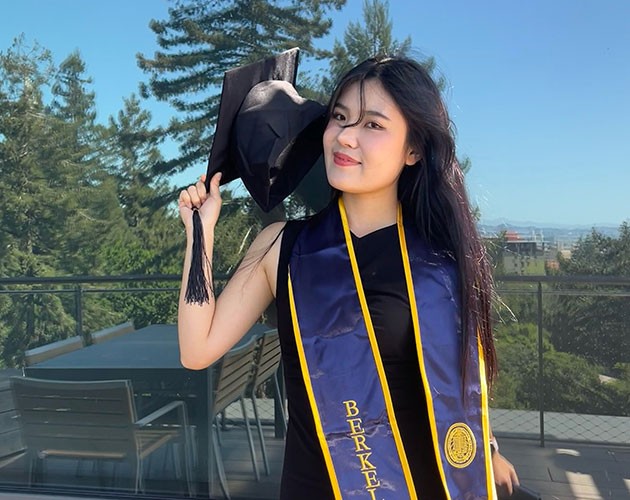Invested in Innovation and AI

The first thing you notice when chatting with Sebastian Sartor—a Fall 2022 BHGAP graduate—over Zoom is his deep connection to UC Berkeley, the program and the people he met during his time here.
He shared a recent experience where a friend from his undergraduate studies, upon learning about Berkeley and BHGAP, reached out to him for information.
Sebastian relates, "We had a phone call to talk about BHGAP, and just last week he sent me a photo from the BHGAP opening ceremony! It's so good to see other people following their dreams—this makes me very happy."
He continued to emphasize that he maintains strong relationships with people whom he met at Berkeley. For instance, his former roommate visited him twice in the past eight months, and in his hometown in Munich, there's a tight-knit community of around 10 people who meet up frequently, sometimes even on a weekly basis. "It's amazing how the sense of community persists during and after the program, even though it was only for five months. I identify much more strongly with Berkeley than with my two German universities."
When asked about what initially drew him to study at Berkeley, he replies, "The reason why I wanted to go to Berkeley is rooted in my passion for entrepreneurship, innovation and, specifically, autonomous driving. In the past, I contributed to the development of an autonomous race car, and I just loved it and had so much energy for it. I even cried when I saw it running for the first time."
The reason why I wanted to go to Berkeley is rooted in my passion for entrepreneurship, innovation and, specifically, autonomous driving. In the past, I contributed to the development of an autonomous race car, and I just loved it and had so much energy for it.
So that passion brought you to Berkeley?
Yes, but actually I had planned to be at Berkeley in 2020 to research the implications of autonomous driving with UC Berkeley professor Susan Shaheen. At the time, I was still an undergrad studying mechanical engineering and business administration at the University of Bayreuth, Germany, and I wanted to realize my childhood dream of living in the San Francisco Bay Area and contributing to autonomous driving research.
Unfortunately, six days before my flight for the planned interview, the U.S. government closed the borders because of COVID, so I just continued studying in Germany. During my master's in management and technology at Technical University of Munich, and after the uncertainties around COVID were resolved, I took a second attempt to go abroad. It was clear to me that it should be a semester abroad, and I wanted to be surrounded by an ambitious community—one that is pushing the boundaries and challenging the status quo. I wanted to study in an inspiring, ambitious and cutting-edge environment and was attracted by the San Francisco Bay Area and its innovation ecosystem.
I came across BHGAP, and my first reaction was, “This sounds cool—let's go for it!” I do not regret my decision at any point.
I had the feeling that at Berkeley, classes were designed to inspire students, foster personal development and prepare students for the future.
How were classes in BHGAP different from those in your master's program?
The experience of how teaching is done at Berkeley is so different from that in Germany, with multiple dimensions to it. First, I can be very flexible in how I study in Germany, meaning I can take no classes at all or sign up for, let's say, 20 courses. I also don't need to decide which ones I will participate in at the beginning; I can decide which exams I'll take a few weeks before the final exam. At Berkeley, you need to decide this very early on and stick to it. You also need to take a minimum number of units.
Second, I'm used to being in a lecture hall with 500 or more students—sometimes up to 2,000. I'd listen to the professor for an hour-and-a-half, talking about theories, definitions, doing calculations on the whiteboard, and then I'd go to the next lecture. I don't have to attend, and oftentimes there are no weekly assignments. At the very end of the semester, there would be one exam that determines my grade.
At Berkeley, on the other hand, you have much smaller classes—let's say 30 to 50 students—that are highly interactive, also due to the fact that professors or guest speakers use fewer slides with text. PowerPoint is just considered a supporting element to the class. Because of the collaborative approach, I had the feeling that classes were more fun, inspiring and effective. I also think they were easier, but because of the weekly assignments, they had more of a workload. I'm also not sure whether any students failed any of the classes I took. In Germany, I was used to failure rates of 20 to 70 percent, depending on the subject. This also implies why in Germany most students study longer than the regular study time.
Third, I had the feeling that at Berkeley, classes were designed to inspire students, foster personal development and prepare students for the future. I think I can pinpoint specific learnings from all the lectures I attended that I would never have learned in Germany because classes there focus on knowledge and skills.
One lecture and professor that stood out was Opportunity Recognition: Technology and Entrepreneurship in Silicon Valley taught by Andrew Isaacs. His teaching method was so engaging that at some point, I started analyzing his way of teaching because his way of educating people represented my role model, and I wanted to know how so that I can be like him.
In one of my master's classes, there was a slide where Gregory La Blanc was cited, and I thought, “This was my professor in BHGAP!” I didn't expect that one!
Any other classes that stood out for you?
I think I learned something from all the classes that will accompany me throughout my life. Besides the engaging Opportunity Recognition class, I also enjoyed Negotiation and Conflict Resolution, from which I'll benefit a lot in the future. I used to think negotiation is about a winning and a losing party, but rather it's about creating a win-win situation.
In the Thriving at Haas and Beyond class, I had a major breakthrough in understanding my passion and why I was so deeply attracted to autonomous driving. The VC class gave me complementary knowledge about how the VC world thinks.
In FinTech, Professor Gregory La Blanc opened my eyes with his strong focus on data, software, AI and blockchain.
I knew Berkeley was a major institution in the U.S. educational system, but I underestimated its significant contribution to computer science, which I learned actually once I was back in Germany. For instance, my computer science classes at the Technical University of Munich frequently referenced Berkeley professors and papers, and in one of my master's classes, there was a slide where Gregory La Blanc was cited, and I thought, “This was my professor in BHGAP!” I didn't expect that one! [Laughs]
Besides classes, I also learned a lot from the company site visits and the numerous guest speakers in class. I specifically learned how Silicon Valley works and what makes it so unique.
When I spoke to Meta, Google and Apple employees, I realized how different these companies are. It's interesting to see that both systems can coexist in such close proximity.
Speaking of site visits, which companies did you tour?
Puh, I don't recall all of them, but I certainly remember Amazon Web Services because I was fascinated by the insights into how they work—no PowerPoints in meetings and their leadership principles—and how they approach developing cutting-edge innovation. Besides that, I loved the Autodesk HQ visit, just because I had a personal connection to their products, and Oracle was also quite fascinating to see from the inside.
I also organized some other field trips with fellow students. We drove to Silicon Valley to visit other companies, which was certainly a highlight for me. I loved visiting all the VC offices on Sand Hill Road. Then, of course, I loved riding a Google bike at Google headquarters or seeing the Sun Microsystems sign at the back of the Meta logo.
What I found very inspiring is that I originally thought that the big tech companies—like Google, Microsoft, Amazon—all have the same company culture. But when I spoke to Meta, Google and Apple employees, I realized how different these companies are. It's interesting to see that both systems can coexist in such close proximity.
What were your top five things to do while at Berkeley?
Hmm, certainly the Silicon Valley tours are on the list. Besides that, I liked attending the events and conferences such as TechCrunch Disrupt or the Cal Hacks Hackathon, watching an NBA game between the Golden State Warriors and the Los Angeles Lakers, the trips with friends to places like Yosemite or Arizona and Utah, and I also loved Taco Tuesday with my friends.
And now you're working on finishing your master's program.
Yes, I still need to complete one small research project and my master's thesis. Luckily, research is my favorite part of my studies as I just love finding answers to questions that no one answered before.
I think I profit a lot from taking many innovation classes because they teach the mindset to identify needs and problems, tackle the status quo, find gaps and develop a solution that generates value. I now apply this mindset to research and thereby find purpose in what I do.
And after you complete your master's?
I love research and teaching. I'm planning to stay in academia while doing a Ph.D. in information systems. And then I’ll see what the future will bring.
What advice would you give to someone starting BHGAP?
I would recommend that you identify with the Berkeley Haas principles, because I found them really good and they have had a positive impact on me. I particularly loved “Confidence without attitude,” “Question the status quo” and “Beyond yourself.”
Explore as much as you can because time is limited. Berkeley offers so many opportunities, and it'd be a shame if you don't make use of them. For instance, I think it's nice to join student clubs and engage with the international community and the Berkeley students.
Lastly, think of how you can have an impact. Think about how you can contribute to a bigger ecosystem in general. The Berkeley ecosystem will support you in ways you won't receive elsewhere to accomplish this.
